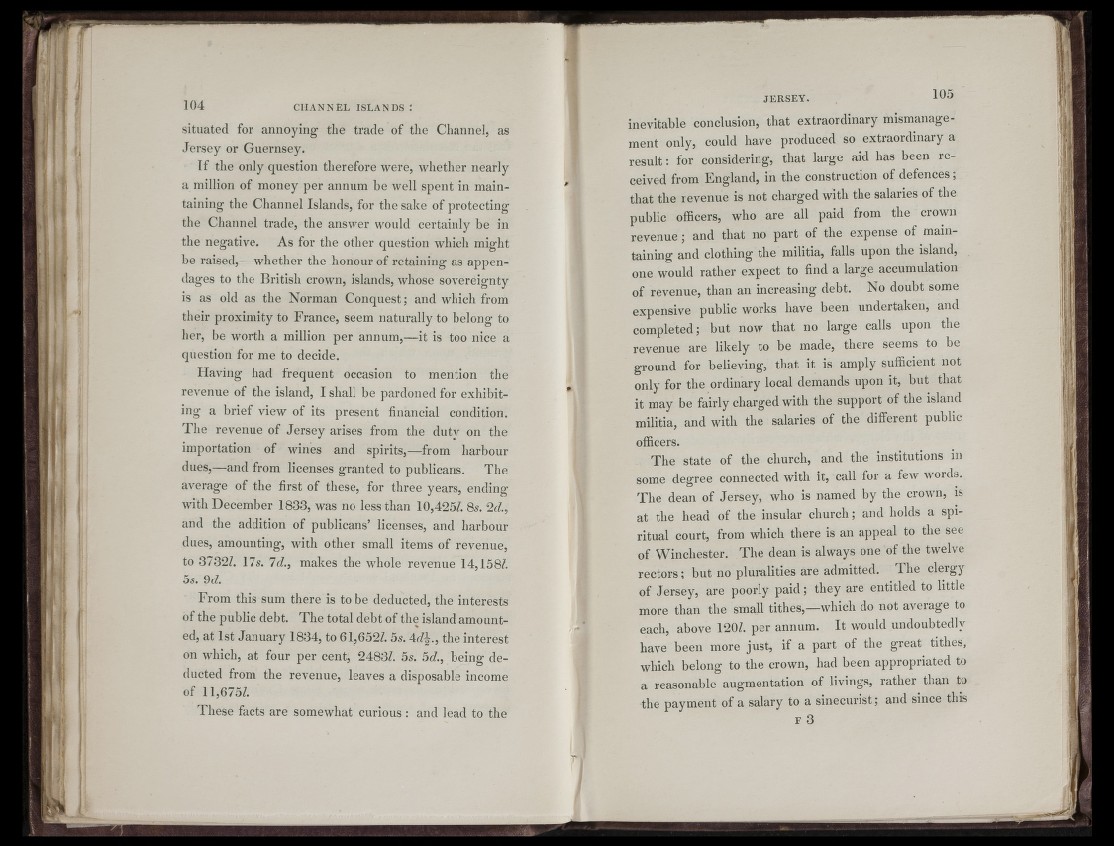
TI I'-
,1 ’ i:
situated for annoying the trade of the Channel, as
Jersey or Guernsey.
If the only question therefore were, whether nearly
a million of money per annum be ivell spent in maintaining
the Channel Islands, for the sake of protecting
the Channel trade, the answer would certainly be in
the negative. As for the other question which might
be raised,—whether the honour of retaining as appendages
to the British crown, islands, whose sovereignty
is as old as the Norman Conquest; and which from
their proximity to France, seem naturally to belong to
her, be worth a million per annum,—it is too nice a
question for me to decide.
Having had frequent occasion to mention the
revenue of the island, I shall be pardoned for exhibiting
a brief view of its present financial condition.
The revenue of Jersey arises from the duty on the
importation of vunes and spirits,—from harbour
dues,—and from licenses granted to publicans. The
average of the first of these, for three years, ending
with December 1833, was no less than 10,425/. 8s. 2d.,
and the addition of publicans’ licenses, and harbour
dues, amounting, with other small items of revenue,
to 3732/. 17s. Id., makes the whole revenue 14,158/.
5s. 9d.
From this sum there is to be deducted, the interests
of the public debt. The total debt of the island amounted,
at 1st January 1834, to 61,652/. 5s. Ad^., the interest
on which, at four per cent, 2483/. 5s. 5d., being deducted
from the revenue, leaves a disposable income
of 11,675/.
These facts are somewhat curious: and lead to the
inevitable conclusion, that extraordinary mismanage-
ment only, could have produced so extraordinary a
re su lt: for considering, that large aid has been received
from England, in the construction of defences;
that the revenue is not charged with the salaries of the
public officers, who are all paid from the crown
revenue; and that no part of the expense of maintaining
and clothing the militia, falls upon the island,
one would rather expect to find a large accumulation
of revenue, than an increasing debt. No doubt some
expensive public works have been undertaken, and
completed; but now that no large calls upon the
revenue are likely to be made, there seems to be
ground for believing, that it is amply sufficient not
only for the ordinary local demands upon it, but that
it may be fairly charged with the support of the island
militia, and with the salaries of the different public
officers.
The state of the church, and the institutions in
some degree connected with it, call for a few words.
The dean of Jersey, who is named by the crown, is
at the head of the insular church; and holds a spiritual
court, from which there is an appeal to the see
of Winchester. The dean is always one of the twelve
rectors; but no pluralities are admitted. The clergy
of Jersey, are poorly paid; they are entitled to little
more than the small tithes,—which do not average to
each, above 120/. per annum. It would undoubtedly
have been more just, if a part of the great tithes,
which belong to the crown, had been appropriated to
a reasonable augmentation of livings, rather than to
the payment of a salary to a sinecurist; and since this
F 3
.